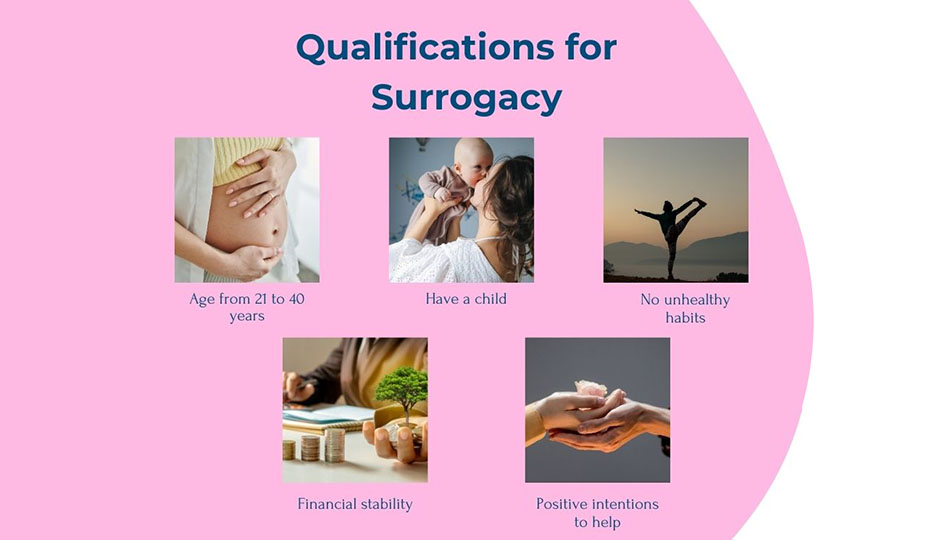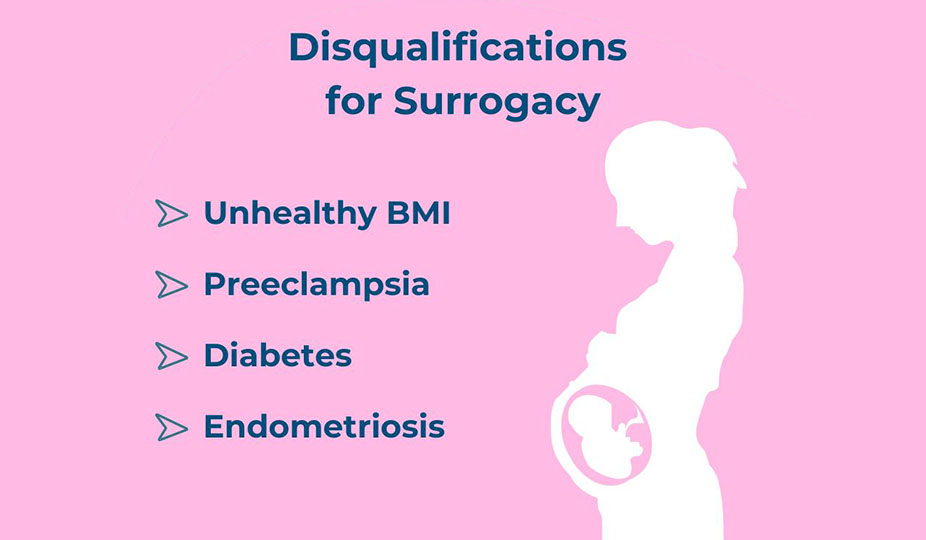Disqualifications for Surrogacy – 10 Stop Signals for Becoming a Surrogate
Gestational surrogacy is a process that allows infertile couples to get a long-awaited baby. It is achieved through IVF: a surrogate mother is implanted with an embryo created from the egg and sperm of the future parents. Many women want to participate in this worthy cause and help couples realize their dream of having a child. However, not everyone is medically eligible for it. Thus, there are several disqualifications for surrogacy, which are aimed at protecting the mother, the child, and the future parents from possible complications.

Today, we will look at the top 10 surrogacy disqualifications and explain why compliance with them is crucial.
Key Qualifications for Surrogacy
To begin with, there are many requirements for surrogate mothers. This is because carrying a child is a complex process that requires the body’s strength and energy. Thus, all the indications aim to protect the woman and ensure a smooth pregnancy and childbirth.

Most agencies determine the suitability of a surrogate mother according to the guidelines of the American Society for Reproductive Medicine (ASRM). Moreover, some doctors suggest additional restrictions that are necessary for the harmless delivery of the baby. Below, you may review the basic requirements:
- Age from 21 to 40 years.
- Experience of at least one easy pregnancy and childbirth.
- No unhealthy habits, including smoking.
- Financial stability.
- Have positive intentions to help.
Disqualifications for Surrogacy
As for the disqualifications on surrogacy, we divide them into two categories. Medical ones – those related to health, and behavioral ones – those related to lifestyle and living conditions. Before starting the program, we conduct a medical examination and interview to check if the woman is suitable. This is necessary to ensure that the program is safe and without incidents.
Let’s take a look at the key disqualifications.

Unhealthy BMI
As you know, weight problems often interfere with a woman’s reproductive health. For example, being underweight causes menstrual irregularities, while being overweight prevents pregnancy and may lead to complications during gestation and childbirth. We consider a woman’s BMI rather than her weight. Acceptable values are from 19 to 32. At the same time, if you are slightly overweight but have experience of unhindered pregnancy, you can be classified as a surrogate mother. If you are obese, we recommend losing weight for safety reasons.
Preeclampsia
Preeclampsia is a pathology that occurs after the 20th week and is characterized by increased blood pressure and the presence of protein in the urine. The consequences of this condition are dire. Severe preeclampsia causes problems with the kidneys and other organ systems. It also affects the development of the placenta, reduces the amount of amniotic fluid, and provokes a frozen pregnancy. We conduct a medical check-up of potential mothers and take blood pressure measurements and urine tests to prevent such pathologies during fetal gestation.
Diabetes
Women with type 1 diabetes cannot become surrogate mothers. Also, carriers of gestational diabetes, a syndrome that occurs during pregnancy, are disqualified. It is associated with glucose intolerance and hormone deficiency, which have complex consequences for the baby. This disqualification includes the following risk factors:
- premature birth;
- low blood sugar in the baby;
- overweight;
- preeclampsia.
Endometriosis
Endometriosis is a hormone-dependent pathology of the female body. It is characterized by benign tissue growths that are similar to the endometrium in terms of functional properties, structure, color, etc. Pregnancy and endometriosis at the same time is a rather dangerous combination, as the risk of miscarriage in the presence of this disease increases significantly. It also provokes several complications that pose a threat to the life and health of the woman and the fetus. Here are the statistics that prove the importance of prohibiting surrogacy in case of endometriosis.
| Complication | Increased Relative Risk with Endometriosis |
| Preeclampsia | 19% |
| Fetal Growth Retardation | 12% |
| Premature Births | 46% |
| Premature Detachment of a Normally Located Placenta | 40% |
| Cesarean Section | 49% |
| Stillbirth | 27% |
| Postpartum Bleeding | 5% |
C-sections
One of the disqualifications for surrogacy is the presence of many cesarean sections. Most often, 2-3 times and less than 5 total deliveries are considered the reference point. At the same time, before accepting a surrogate mother with a cesarean experience, we check all systems and a simulation cycle to make sure that she will carry a baby.
Unhealthy Habits
Surrogacy is not about an unhealthy lifestyle because couples expect to receive a healthy baby without defects or developmental disabilities. That is why alcohol, tobacco, and drug use are prohibited before conception and during pregnancy. This is a necessary measure to ensure the smooth development of the fetus.
Mental Illness
There are many mental illnesses and disorders, such as depression or eating disorders, that require ongoing treatment and tranquilizers. Most often, these medications are not compatible with pregnancy. Moreover, mental problems cause stress and nervous breakdowns. It may lead to miscarriage and endanger the health.
No uterus
In the absence of a uterus, a woman cannot become a surrogate. It is quite logical because, in the absence of the uterus, there is no environment for the development of the fetus. However, you can still become an egg donor and help infertile couples become parents.
No children
Bearing at least one child is a prerequisite for surrogacy. Why is it important? Having a successful childbirth experience makes it possible to predict possible easy pregnancies in the future. Thus, we study the prenatal and birth histories to anticipate complications and avoid them.
Unfavorable Living Conditions
Environment, habits, and nutrition affect the development and formation of the fetus. That is why women who live in unfavorable conditions may be disqualified. It includes staying in unsafe places or having a difficult financial situation.
Is PCOS Disqualification for Surrogacy?
Polycystic ovary syndrome, or PCOS, is a fertility disorder that often causes a lack of ovulation and menstrual irregularities. Women with this disorder may have difficulty conceiving and carrying a child. For this reason, some agencies prohibit patients with the syndrome from becoming surrogate mothers to preserve the health of the woman and the baby.
However, the situation is not so clear-cut. According to the rules of many clinics, you will not be immediately disqualified if you have PCOS. The degree of the disease and indicators of general well-being play the main role. In such cases, we thoroughly examine the possible risks and ensure a safe childbirth. It includes glucose monitoring, regular ultrasounds, blood work, and hormone testing.
Thus, even if you have PCOS, you may become a surrogate. However, it will require additional examinations and careful monitoring.
Final Thoughts
In summary, surrogacy is a big responsibility that requires mental and physical health to ensure a satisfactory childbirth. There are a number of disqualifications for surrogacy that ensure that the program will be safe for all parties. Some rules may be more lenient or strict and vary from agency to agency. That is why, if you decide to become a surrogate mother, the best advice is to seek detailed advice from a specialist. Our reproductive experts guarantee that you are properly examined and that the program is carried out in compliance with all requirements. Don’t hesitate to contact us to become a surrogate mother and give couples the joy of parenthood.
Disqualifications for Surrogacy FAQ
It depends on the contract that you sign before you join the program. However, usually, in cases of miscarriage, you will receive compensation for the time you were pregnant. In addition, you get full coverage for any medical treatment you need during your pregnancy.
We set the following requirements for future surrogates:
– age between 21-40 years;
– having given birth to at least one healthy child;
– passing medical and psychological evaluations;
– leading a stable and healthy lifestyle.
Yes. You may be a surrogate if you have had C-sections. However, we consider the number of C-sections and the medical outcomes of your previous pregnancies.
A woman’s psychological state is an important indicator that directly affects her well-being during pregnancy. Therefore, if you are experiencing mental instability, you will be disqualified for reasons of your safety. If you are in remission and have recovered from this condition, we will conduct a detailed examination to check your readiness.